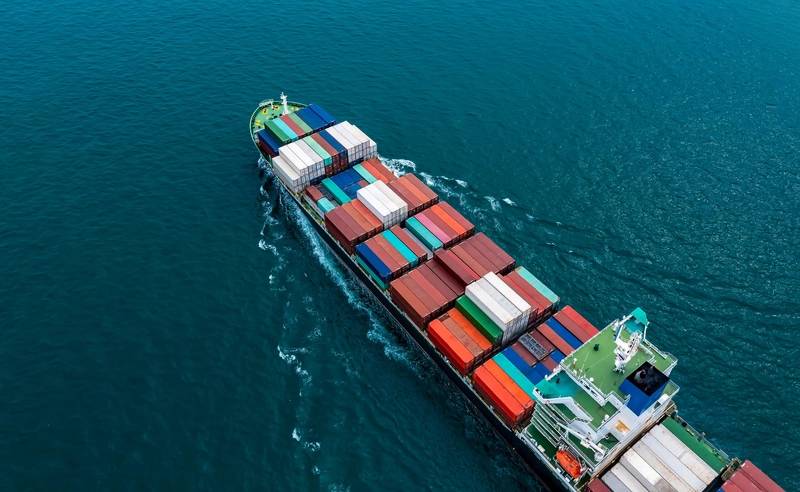Houthi Attacks Expose China's Commercial Stakes in Red Sea
China has called for an end to attacks on civilian vessels in the Red Sea that have dramatically widened the Hamas-Israel conflict and placed Beijing's commercial interests along the Suez Canal at risk.
The Iran-backed Houthi militia from Yemen that seeks "Death to Israel" is challenging the ability of the world's biggest trading nation to defend billions in strategic investments in Egypt.

Since President Abdel-Fattah el-Sisi came to power in 2014, China has stepped up its investment and commercial activities along Egypt's Suez Canal, through which a significant amount of the Asian giant's West-bound goods flow.
Investment and trade
Beijing has encouraged state-owned companies to invest tens of billions in Egypt's logistics, transport and energy sectors, data from the American Enterprise Institute (AEI) think tank shows, and has extended $3.1 billion in loans, according to the World Bank.
And in the months leading up to Hamas' Oct. 7 attack on Israel alone, firms from China and Hong Kong pledged at least $20 billion in various projects along Egypt's arterial waterway.
Attacks deterring commercial shipping from the Red Sea and Suez Canal could frustrate Chinese investors who have committed huge sums to the waterway's development to profit from their safe passage.
State-owned shipping giant COSCO, which on Jan. 7 joined Maersk, Hapag-Lloyd, Evergreen, and other major shipping lines in suspending services to Israel, last March invested $1 billion in Egypt's port infrastructure, according to the AEI.
COSCO was joined by CK Hutchison Holdings, a prominent Hong Kong-based conglomerate, which in March announced plans to put up a further $700 million to develop a new container terminal in the Red Sea port of Ain Sokhna and in B100, a new container terminal in the Mediterranean port of Alexandria.
That same month, demonstrating China's broader commercial interests in Egypt as a link between Asia and Mediterranean and European markets, Xinxing Ductile Iron Pipes made known plans to invest $2 billion in iron and steel plants, also in Ain Sokhna.
And in October, Egypt's Suez Canal Economic Zone struck a $6.75 billion deal with state-owned China Energy to develop green ammonia and green hydrogen projects in the Sokhna Industrial Zone, as well as a $8 billion agreement with Hong Kong-listed United Energy Group 0467.HK to establish a potassium chloride production site.
Equally at stake is President Xi Jinping's flagship Belt and Road Initiative, of which Egypt, Yemen and Iran are all members.
China consistently maintains it will not interfere in the domestic affairs of other sovereign states, leading analysts to question how it should respond when problems emerge among BRI members.
The dilemma arises in particular when the issue fundamentally undermines the BRI's stated purpose, which is to connect Asia with Europe through the creation of a series of continent-spanning investment and trade corridors.
Reputation on the line
More than money is at stake.
Beijing is under pressure to prove that its involvement in an unexpected detente between regional rivals Saudi Arabia and Iran in 2023 went further than dotting the "i"s and crossing the "t"s.
Following that agreement, China's top diplomat, Wang Yi, currently in Egypt as part of a tour of four African countries, said Beijing wants to play a constructive role in handling global "hotspot issues."
U.S. officials believe China to be instrumental in reining in Iran, and have reportedly pressed Beijing to use its influence over Tehran to help prevent the conflict between Hamas - which is also backed by Iran - and Israel from spreading.
When COSCO was still visiting Israeli ports despite its competitors having already re-routed Asia-to-Europe voyages via South Africa's Cape of Good Hope, some analysts questioned whether Chinese influence over Iran was playing a part. Iranian oil makes up some 10% of China's crude imports.
Bloomberg reported on Thursday at least five vessels transiting the Red Sea were signalling "all Chinese crew" or words to that effect in a space on a communications network that would normally contain the ship's destination to try and avoid attack.
China's Wang Yi in Cairo on Sunday told his Egyptian counterpart that Beijing backed a larger, more authoritative Israeli-Palestinian peace conference and a timetable to implementing a two-state solution.
So far, China appears restrained in its diplomacy because of its position of non-interference in other sovereign states' internal affairs. Yet at the same time it aspires to raise what Wang has referred to as China's "international influence, appeal and power" to shape events through diplomacy
(Reuters - Reporting by Joe Cash, Editing by William Maclean)
